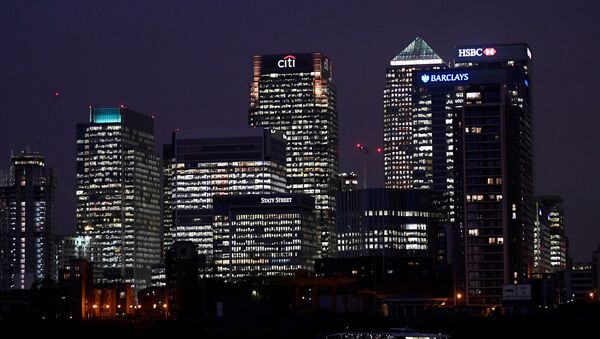Kristian Rouz – The British economy is expected to accelerate in 2018 as both salaries and output have increased this outgoing quarter, defying pessimistic predictions.
This comes as the post-Brexit referendum surge in inflation has eased due to the Bank of England’s (BOE) increase in interest rates, while the rise in exports and declining unemployment lifted consumer purchasing power.
Two separate reports showed signs of modest wage inflation and rising business output, likely ending the years of stagflation concerns, which followed the European debt crisis of the early 2010s.
According to a report from job advertisement search engine Adzuna, average salaries in November rose 1.2 percent year-on-year, the first yearly gain since mid-2015. This will contribute to a further escalation in inflationary pressures on the economy, likely prompting the BOE to continue normalizing its monetary policies next year.
READ MORE: Labour Voters 'May Abandon Party' at the Next UK Election Because of Brexit
The central bank raised its borrowing costs from the first time in a decade last month, from 0.25 percent to 0.5 percent, rendering business credit costs higher, and curbing the post-referendum spike in price growth.
“We have kept our forecast of status quo in 2018 on the back of squeezed household purchasing power and postponed business investment, yet any larger upside news in 2018 could make us change our call,” Sylwia Hubar, a research analyst at the French investment bank Natixis, said.
Adzuna said average advertised salary last month stood at £32,598 across the UK. In London, salaries rose 2.2 percent annualized to £39,457 per year, while university graduates faced a drop in pay by 12.2 percent, to £21,814 per year.
A separate study from the Confederation of British Industry (CBI) showed an improved economic sentiment among British businesses. Private sector enterprises increased their output +19 percent in the September through November period across-the-board, with all sectors saying their production exceeded long-term averages.
“Private-sector firms are enjoying healthy activity levels as we approach the year end, but mediocre expectations for growth underline the ongoing challenges facing companies,” the CBI's head of economic intelligence Anna Leach said.
The CBI also said the ongoing expansion might slow down in the coming months due to possible international headwinds and political uncertainty hurting the investment climate.
The UK’s consumer price index (CPI), or core inflation measure, rose to 3.1 percent in November despite the BOE’s interest rate hike that month. The current pace of wage inflation is insufficient to support consumer purchasing power at that rate of core inflation, meaning the central bank will undertake more policy tightening measures soon.
This would also require an appropriate fiscal response from the cabinet of Prime Minister Theresa May. The government has so far been reluctant to loosen the purse strings, as the widely despised austerity measures continue.
READ MORE: Post-Brexit Blues: Changing Color of British Passport Highlights Social Divide
The UK’s economic growth accelerated to 0.4 percent quarter-on-quarter in Q3 due to a stronger household consumption offsetting a weaker growth in fixed investment.
“Similar gains are likely over 2018 but they won’t be fast enough to put a rocket under the dormant wage growth figures,” Dan Hanson of Bloomberg Economics said. “Headline inflation falling back, together with weak underlying cost pressure, should stay the BOE’s hand next year.”
According to another study from the Resolution Foundation, next year’s inflation-adjusted earnings growth is poised to be zero – still an improvement from this year’s negative dynamics. However, an adequate fiscal response coupled with the ongoing increase in central bank interest rates could push earnings growth into positive territory.
The BOE said the economy’s growth potential had been limited prior to the spike in inflation, which drove consumer spending in late 2016-early 2017. Current inflation expectations refer to growth in prices as a result of a quicker economic growth rather than a weakening pound, suggesting the economy is gradually recovering after the initial Brexit shock.




